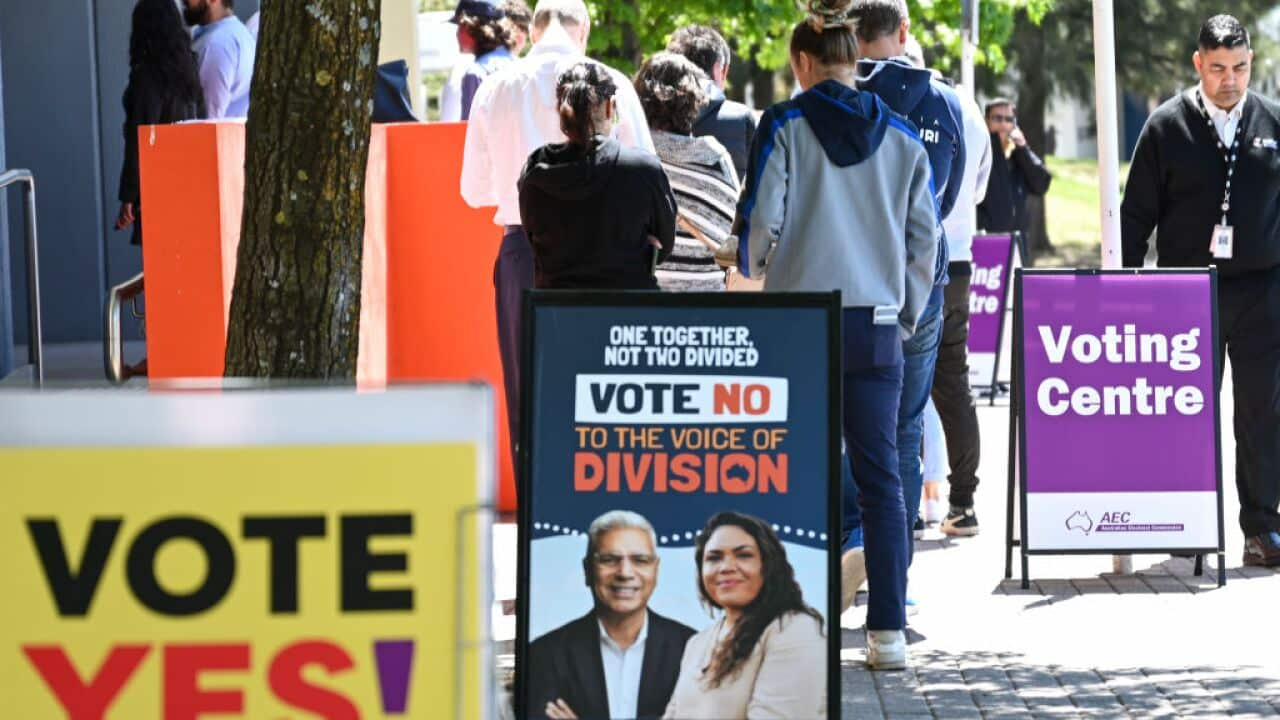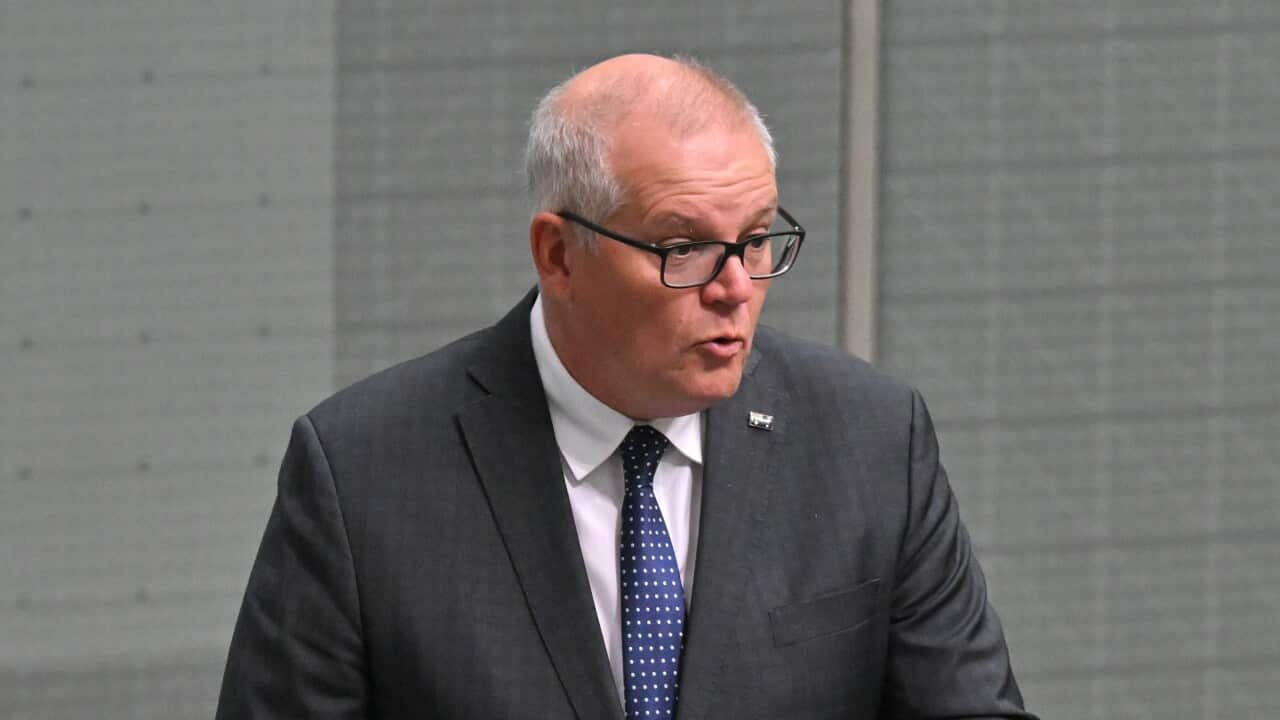KEY POINTS:
- More than 17 million Australians are registered to vote in the referendum later this year.
- The passage of the Voice referendum bill triggers the process of setting a firm date for the vote.
- The date must be set within two months and six months from today.
Australians will officially vote on the Voice to Parliament within the next six months, after the bill to trigger the referendum passed the Senate 52 votes to 19.
Parliament formally jumped its final hurdle ahead of the referendum on Monday, with Australians now set to decide whether to enshrine the Voice - a key pillar of the 2017 Uluru Statement from the Heart - in the constitution.
Yes campaigners have declared "parliament's work is done", with the debate now set to be steered by a grassroots push for constitutional change.
Minister for Indigenous Australians Linda Burney said the development brought Australia "one step closer" to acknowledging Indigenous Australians in the Constitution and making a "great country even greater".
"It's on ... Today, the political debate ends. Today, we can start a national conversation at the community level," she said.
"For too long, Indigenous Australians have been consistently worse off than non-indigenous Australians ... It's a broken system. And the Voice is our best chance of fixing it, because when we listen to people on the ground and consult with locals, they make better decisions and achieve better outcomes."
Labor stresses the Voice would be a purely advisory body, giving Indigenous Australians the opportunity to advise parliament and government on issues that particularly impact them.
But some of its critics claim the proposal is fraught with risk, while others argue it gives insufficient power to Indigenous people.
The first referendum in nearly a quarter of a century will take place sometime between two and six months from Monday, though Prime Minister Anthony Albanese has flagged it will take place this year.
"This once-in-a-lifetime opportunity to lift our great nation even higher," he declared.

Independent Senator Lidia Thorpe reacts after the passing of the Voice to Parliament in the Senate chamber at Parliament House. Source: AAP / Lukas Coch
"This is an opportunity to do things better, instead of doing things for Indigenous Australians, [to] make change with Indigenous Australians."
Coalition waves through referendum bill
Despite opposing the Voice, the Coalition waved through the bill on Monday morning.
Liberal frontbencher Michaelia Cash argued a Yes vote would "irrevocably change" Australia's constitution, claiming Labor had failed to provide sufficient detail on how the "divisive" body would function.
"[But] we believe in the people of this nation, and their right to have a say on this issue," she said.
"It's unknown, it's divisive, and it's permanent. If you don't know how the Voice is going to work, my humble opinion is: vote No."
Coalition Indigenous Australians spokeswoman Jacinta Price, a Warlpiri/Celtic woman, argued that leaving Parliament to thrash out details after the referendum was fraught with legal risk.
"The prime minister wants us to blindly trust him to sign his blank cheque and allow his risky proposal to be enshrined forever in the constitution, when he cannot guarantee anything," she said.
A handful of Coalition members voted against the bill, a technicality that will allow them to contribute to the No case in formal referendum pamphlets, which will be distributed to voters.
Greens welcome 'truly historic day'
Greens Indigenous Australians spokeswoman Dorinda Cox, who compromised on her preference for Treaty and Truth to come before the Voice, heralded a "truly historic day" for First Nations Australians.
"The parliament's work is done. It's time for the grassroots Yes campaign to get out there in the community and share with all Australians why this referendum is so important, and why a Voice to Parliament is so important," she said.

Ms Burney, seated left, was present for the debate. Source: AAP / Lukas Coch
As Senator Cox stressed the Voice would not undermine Indigenous sovereignty, she was repeatedly interrupted by independent senator Lidia Thorpe, who quit the Greens to campaign freely on the Voice.
"Prove it!" Senator Thorpe repeatedly said.
Lidia Thorpe blasts 'fake and pretend' Voice
Senator Thorpe, a DjabWurrung, Gunnai and Gunditjmara woman, described Monday as "assimilation day" and is urging Australians to boycott the referendum.
Rising to speak, Senator Thorpe described the legislation as the "final nail in the coffin", but is yet to reveal which way she will vote in the referendum itself.
"I'll be voting No to this disastrous idea of giving us no power," she said.
"But I can't support something that gives my people no power. I can't support something that is handpicked by whomever is in power."

Minister for Indigenous Australians Linda Burney poses for a photo with 40 members of Jawun at Parliament House in Canberra. Source: AAP / Mick Tsikas
"Yes, I'm here to infiltrate it, [to] rattle the cages, [to] destroy the white supremacy that is represented in this place."
Senator Thorpe, who wore a t-shirt emblazoned with the word 'Gammin' during the debate, demanded Parliament implement the recommendations from Royal Commission into Aboriginal deaths in custody.

Independent senator Lidia Thorpe reacts during debate on the Voice to Parliament in the Senate chamber at Parliament House. Source: AAP / Lukas Coch
"We're hearing all these beautiful, heartfelt stories about how this is going to fix our lives. It's going to solve everything. We can't even do anything until after this referendum ... Meanwhile, children are being tortured in prisons."
Speaking during Monday's debate, Labor frontbencher Malarndirri McCarthy urged Australians to vote yes "for a better future" and said the Voice would mean "a great deal" to Indigenous people.
"[Indigenous people] are reaching out to all Australians, to be able to feel proud of this time in our country's history, where we can lift one another up," she said.
"Where First Nations people can be and feel very much a part of the complete fabric."
Concern over tone of debate after Pauline Hanson comments
After One Nation senator Pauline Hanson urged Australians to “ask why” the Stolen Generations had occurred, Senator McCarthy conceded she was concerned about the tenor of the debate in coming months.
Senator McCarthy urged Australians to “listen to the better side of yourself” throughout the debate.
“I am concerned, a little bit, when I hear about some of the commentary that goes on,” she said.

Senator McCarthy conceded concern over the tenor of the debate, just moments after Pauline Hanson's (pictured) comments. Source: AAP / Lukas Coch
“It is only then can we find the better part of ourselves as a country, the better part of ourselves as Australians.”
Senator Hanson had earlier claimed that many of the Stolen Generations would “not have survived” without their removal.
“You know, you talk about the Stolen Generation. It did happen at the time. Ask yourself why,” she said.
The extensive 1997 Bringing Them Home Report found the removal of Indigenous children from their homes was a gross violation of human rights, with the descendants of taken children more likely to be jailed, suffer health issues, and less likely to find employment.
Mr Albanese said he had not seen Senator Hanson’s comments, but assumed they were consistent with things she had said in the past.
“I don't intend to respond to them, because I don't think that they're worthy of a prime ministerial response. I will call for respectful debate across the board,” he said.
“No matter what way people are voting, advocates [should] to do their best to stick to the facts, to not say things that they know are not true.”
Linda Burney says Voice will bring structural change
Referendums are passed by a so-called double majority - an overall majority and a majority in most states. Residents of the NT and the ACT do not count towards the latter.
Independent senator David Pocock stressed residents in the ACT and NT do not have an equal vote.
Senator Pocock described the Coalition's attempts to frame the referendum as "the Canberra Voice" as "blatantly untrue".
"This is the result of one of the most consultative processes in Australia's history ... Yes, if it isn't broken, don't fix it. But if it's broken, it requires fixing. This is an opportunity to fix it," he said.
An Indigenous Voice to Parliament was one of the requests of the issued by Indigenous leaders in 2017.
Australians will be asked later this year in a referendum -by voting Yes or No - whether they support a change to the constitution to create a permanent independent body to parliament and the federal government to provide advice on issues affecting Indigenous Australians.
The design and details of the model would be determined by MPs in parliament in the event of a successful referendum.
Ms Burney said she believes the proposal will be the circuit breaker needed to target the poorer health, socio-economic and life expectancy outcomes experienced by Aboriginal and Torres Strait Islander people.
An update on Closing the Gap targets - tracking the gulf between Indigenous and non-Indigenous Australians on health, social and wellbeing metrics - released last week showed .
"It does bring about structural change, and it will move the dial on issues like close the gap," she said.
"The power lays within the principles - it has an enormous moral authority to start with. Think about the principles: It will be independent, and it will give independent advice not only to parliament but also to [the federal] government.
"It will be accountable. It will be balanced, it will be community-led, and it will exist within structures and organisations that exist now."
'Get the bureaucracy out of it'
The leader of the National Party, David Littleproud, declared in November last year that his party would be campaigning for a No vote on the Voice to Parliament.
At the time he said he didn't think the proposal would "genuinely close the gap".
He said he still adopts that position and he believes the solution doesn't require a constitutionally enshrined Voice to Parliament.
"Governments have poured billions of dollars to try to solve this problem [of close the gap] but we have done it in the wrong way," he told ABC radio.
"The intent of the equality has always been there, it is just the execution," he said, admitting that his party within the Coalition government over 12 years was part of the problem in the failed approach.
"We failed. I am not afraid to say that governments of all persuasions have failed...If you get the bureaucracy out of it, we can close the gap."
He said the answer involves solutions at the community level, without the need for a Voice to Parliament.
"That is where elders at a local community - not at a regional level - need to be engaged and empowered...It is about getting bureaucrats out of Canberra and putting them around town halls and campfires and listening to those elders."



